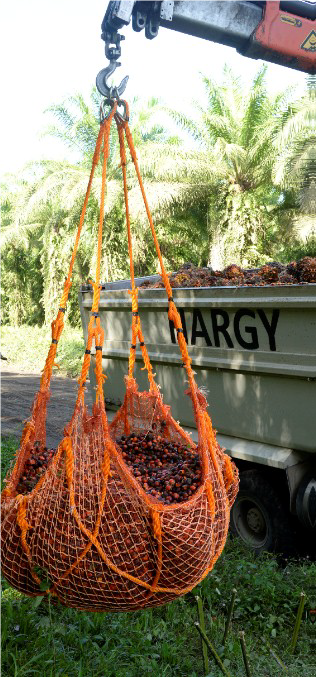- SIPEF
- Sustainability
- Smallholders
Sustainability
Smallholders
In the 1960s West New Britain was selected by the then Australian Administration for the establishment of large scale commercial agricultural crops as a means to further economic development.
The first commercial palm oil establishment was developed at Hoskins as a smallholder project, and after two to three years of planting, it progressed into the Bialla district just before Papua New Guinea achieved independence.

The government was supporting the development of smallholder areas in remote locations in Papua New Guinea through its Land Settlement Scheme (LSS) and Village Oil Palm (VOP) programmes.
Under the Land Settlement Scheme programme, families could start as smallholders on blocks of land that were roughly 4 to 6 hectares in size, with 2 hectares set aside for housing and food crops. The Village Oil Palm programme involved customary landowners and companies supported them in developing selected areas for palm cultivation on their land.
Today, there are approximately 3 635 smallholder blocks with 14 890 hectares of oil palm development scattered along the coast of West New Britain alongside SIPEF’s company plantations. As other development options for the communities are very limited, palm cultivation has a significant impact on the livelihoods for communities in these regions and supports families by providing them with a regular income.
The total smallholder area is divided into three divisions, with 34 subdivisions. When driving from Kimbe to Bialla, the first division is called Cenaka, followed by the second division Maututu, and then towards East New Britain is Meramera.
Associated Smallholders
In Papua New Guinea, the type of smallholders SIPEF works with are ‘associated’ smallholders. Associated smallholders are in principle independent as they own their own land and take full ownership of the choice of crop and management decisions. However, due to their geographic location, they can only sell to mills within their vicinity, and there is a standing arrangement with SIPEF’s subsidiary in Papua New Guinea, Hargy Oil Palms Ltd. (HOPL). As such, they are classified for certification purposes as scheme smallholders.
Associated smallholders supply around 39% of the fresh fruit bunches (FFB) processed in HOPL’s three mills. HOPL works with the smallholders both directly and through the Local Planning Committee, which is made up of representatives from the Oil Palm Industry Corporation (OPIC), the Bialla Oil Palm Growers Association (BOPGA), the Oil Palm Research Association (OPRA), the East Nakanai Local Level Government (ENLLG), and the company.
HOPL operates a smallholder transport department and collects the crops from each smallholder individually. The company sells tools and fertiliser at cost and on interest free credit, where needed and upon request. It also assists with replanting and ensures only quality seedlings are supplied.
The company also makes payments directly to each individual smallholder via bank transfer every fortnight. Where applicable or requested, HOPL will divide the payments across different household members. Many families have opted to split the payments across the different accounts of individual family members in order to ensure that women of the households are also receiving their share directly.
RSPO Certification
All of the smallholders in the supply base of HOPL have been successfully certified for compliance with the Roundtable on Sustainable Palm Oil (RSPO) standard. Unlike many of SIPEF’s other scheme smallholders in Indonesia, these growers manage their own farms and therefore need to individually comply with the company’s policies and the RSPO Principles & Criteria.
HOPL provides its smallholders with regular trainings, and conducts block inspections and internal audits in support of their re-certification process. The Company also hosts field days for the smallholders, which together with the trainings, ensure they are up to date with the latest best management practices.
All 3 635 smallholders have been integrated in HOPL’s certification since 2009, and share in all premiums which SIPEF receives through the sale of certified products.
Details on premiums paid to smallholders in Papua New Guinea can be found in SIPEF’s Sustainability Reports
Increasing yields and production efficiency
Aside from maintaining RSPO certification, one of the main goals of the smallholders working with HOPL is to sustain the current planted area, while achieving a production rate of 20 tonnes per hectare by 2025. A key challenge here is to consistently increase yields and reduce the gap between the company’s plantation yields and the smallholders’ yields.
To support this goal, HOPL has since 2017 increased its direct involvement in the extension services provided to smallholders, a collaboration that has been hugely positive. Together with the farmers, they are investing in improving the farmers’ knowledge of effective production practices, whereby the yields are expected to increase further over time.
Both OPRA and OPIC provide extension and research and development services relevant to smallholders. The central role of both organisations is to increase smallholder productivity, promote improved farm management techniques, provide advice and education regarding oil palm production methods, and enhance the well-being of smallholders. Services include research on integrated pest management, pest and disease control, outreach and awareness, and projects related to livelihoods and community development.
The General Manager of HOPL is active on the board of OPRA. For more information on OPRA, please visit www.pngopra.org